Mango is a delicious fruit that has grown immense popularity over the years, becoming one of the most famous fruits on the planet. This fruit is enjoyed by both humans and some specific animals. Now, what about our guinea pigs, how does mango fit into their diet?
Can guinea pigs eat mango? Guinea pigs can eat mango. They really enjoy the taste and texture of this delicious fruit. Mangoes have many nutrients that are beneficial for guinea pigs, and most importantly, they are rich in vitamin C. But, because of sugar content, mangoes need to be regulated and given only in moderation.
Now that you know that guinea pigs can eat mango, why not learn more about mango and how to implement it into their diet? Let’s find out how many mangoes can guinea pigs eat and in which moderation is mango safe for them. Also, read more about the health benefits and risks to consider when feeding mangoes to guinea pigs. Let’s begin!
Table of Content
Is Mango Good for Guinea Pigs? | Health Benefits
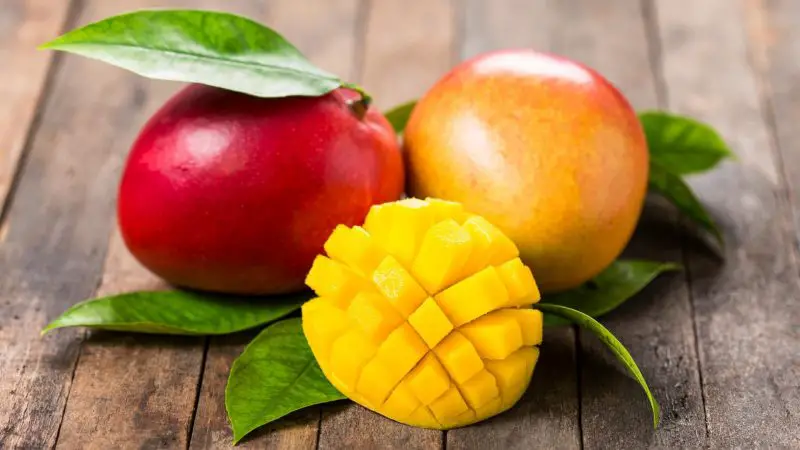
Mangoes are beneficial to both humans and animals. But in this case, we will take a deeper look at how they can benefit our guinea pigs:
Elimination of Free Radicals
Free radicals naturally occur due to metabolic processes in the body, but they can cause harm if not dealt with accordingly. Mangoes are packed with antioxidants that can subdue free radicals. If not taken care of, the free radicals can advance to the cells and cause severe damage.
Mangoes Can Boost the Immune System
This fruit has nutrients that can help strengthen your pet’s immune system. Guinea pigs are generally sensitive, and they don’t have a robust immune system. Boosting their immunity will go a long way in keeping them healthy for a long time.
Mangoes have vitamin A which is known for improving the immune system. This vitamin also helps to ward off diseases from the guinea pig’s body. In addition to vitamin A, there are also other vitamins in mango that can help boost immunity, such as vitamin E, vitamin B-6, and vitamin K.
Mango Will Provide Vitamin C for Guinea Pigs
These pets cannot naturally create nor store vitamin C in their bodies. Thus, they need an external source for it. This vitamin helps with the production of white blood cells, which aids in fighting scurvy and other different diseases.
Boosts Cardiovascular Health
Heart health is essential for the proper functioning of the body. Mangoes have nutrients that can help in maintaining a healthy heart. Minerals such as magnesium and potassium, found in mangoes, help to regulate the heart and the relaxation of blood vessels in the heart. In addition to that, mango also helps to maintain optimum blood pressure levels.
Helps to Prevent or Reduce Inflammation
Inflammation is a response from the body to injury or disease. Mangoes have many antioxidants, vitamins, and minerals that can help reduce inflammation in guinea pigs.
Helps in Digestion
Amylases are a group of digestive enzymes found in mangoes that help with the digestion process. These enzymes break down the large food molecules into small portions that can easily be digested.
In addition to the enzymes, mangoes have a sufficient amount of water and dietary fiber that help with the digestive process as well. Fiber, for instance, helps to reduce constipation and diarrhea.
Mango Is Good for Eye Health
Antioxidants such as zeaxanthin and lutein are beneficial for good eyesight. Vitamin A is also an excellent nutrient that can benefit the eyes and the lack of this vitamin is attributed to night blindness or dry eyes.
Mango Is Able to Induce Satiety
Because of the presence of a sufficient amount of dietary fiber, mangoes can help with weight regulation.
Nutrition Facts of Mango for Guinea Pigs
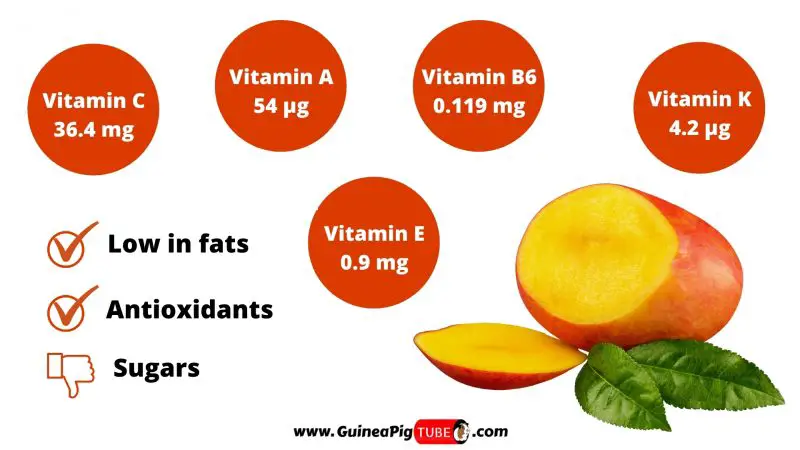
The following are some of the nutrients contained in 100 g of mangoes:
- Energy – 60 kcal
- Protein – 0.82 g
- Total lipid (fat) – 0.38 g
- Carbs – 14.98 g
- Dietary Fiber – 1.6 g
- Sugars – 13.66 g
- Calcium – 11 mg
- Magnesium – 10 mg
- Phosphorus – 14 mg
- Potassium – 168 mg
- Vitamin C – 36.4 mg
- Vitamin B-6 – 0.119 mg
- Vitamin A – 54 µg
- Vitamin E – 0.9 mg
- Vitamin K – 4.2 µg
- Folate – 43 µg
- Carotene, beta – 640 µg
- Lutein + zeaxanthin – 23 µg
Is Mango Poisonous to Guinea Pigs? | Possible Risks
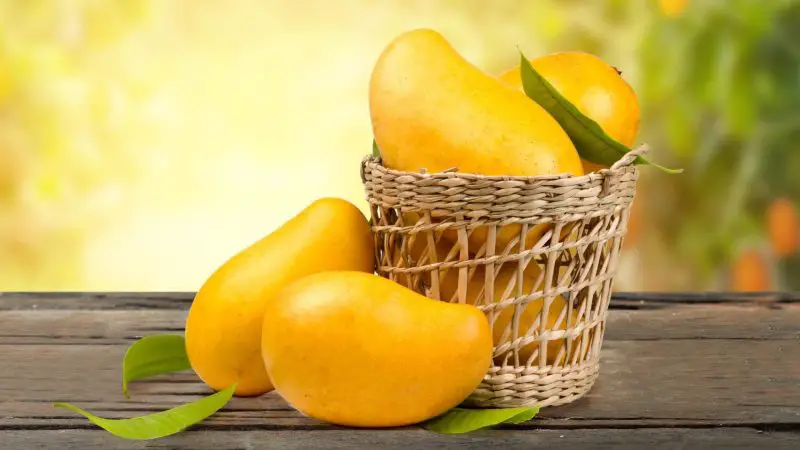
Mangoes are relatively safe fruits and don’t have many risks for your guinea pigs except for the following:
Too Much Sugar
The mangoes are quite sugary. When fed to guinea pigs in large quantities, they can cause diarrhea or vomiting. If you notice this, you need to immediately stop the feeding process and give the cavy a sufficient amount of water.
Allergic Reactions
Guinea pigs can be allergic to certain foods, and some parts of mangoes have an unhealthy oil that may cause allergic reactions. If you notice symptoms like diarrhea, vomiting, or sneezing, you should avoid feeding your guinea pigs with the mango.
Serving Size and Frequency of Mango for Guinea Pig
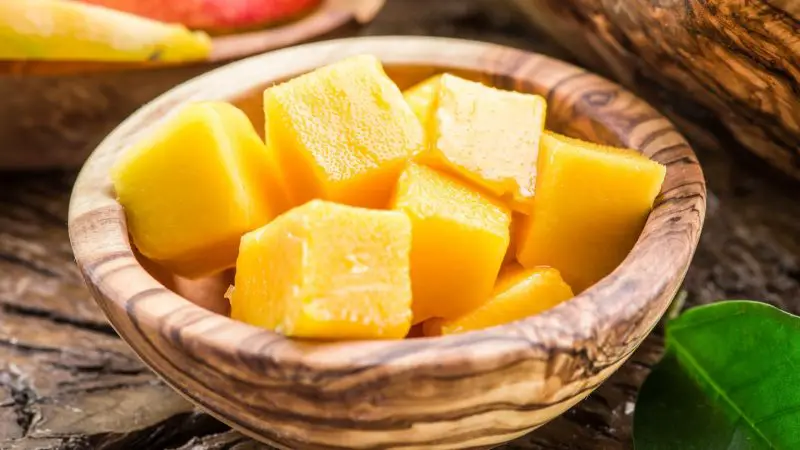
Can Guinea Pigs Have Mango Every Day?
Guinea pigs shouldn’t eat mango every day because this fruit has a lot of sugars, which is not ideal for your pet’s digestion and diet. On average, once or twice a week is enough to feed your guinea pigs with mangoes.
You can feed them only hay and freshwater every day. If you want to provide your guinea pigs with a proper diet that has different nutrients, you should give them different types of fruits and vegetables.
How Much Mango Can Guinea Pigs Eat?
There is a lot of sugar in mango. Because of that, guinea pigs shouldn’t eat mango daily. Also, when you feed mango to guinea pigs, it’s not recommended to give them a large portion. Feed them only a half cup or 2-3 small tiny pieces of mango. This amount of mango is enough for one guinea pig to get all the beneficial nutrients and to avoid any risk.
More Information About Guinea Pigs and Mango
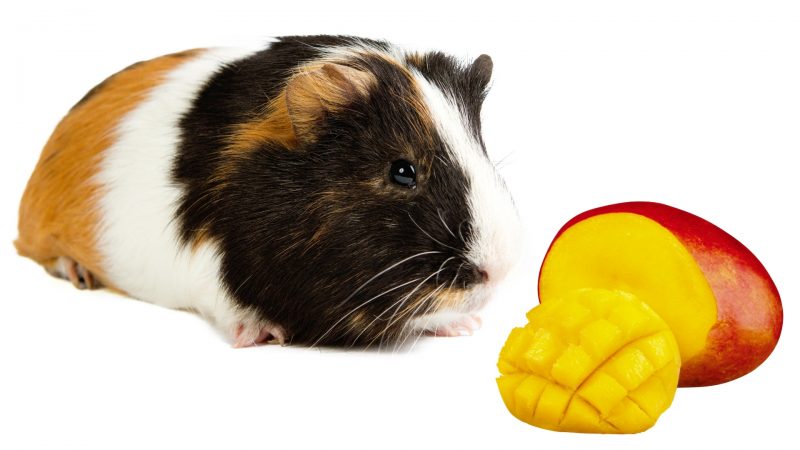
Can Guinea Pigs Eat Mango Skin/Mango Peel?
Guinea pigs shouldn’t eat mango skin for several reasons. One of them is that the skin of mango contains urushiol, which is an oily mixture of organic compounds with allergenic properties that can be also found in poison ivy and oak.
Other reasons are that mango skin can be a choking hazard for guinea pigs because of its hard texture. Also, mango skin can contain some residual pesticides that can be very harmful to your little pets.
Can Guinea Pigs Eat Mango Leaves?
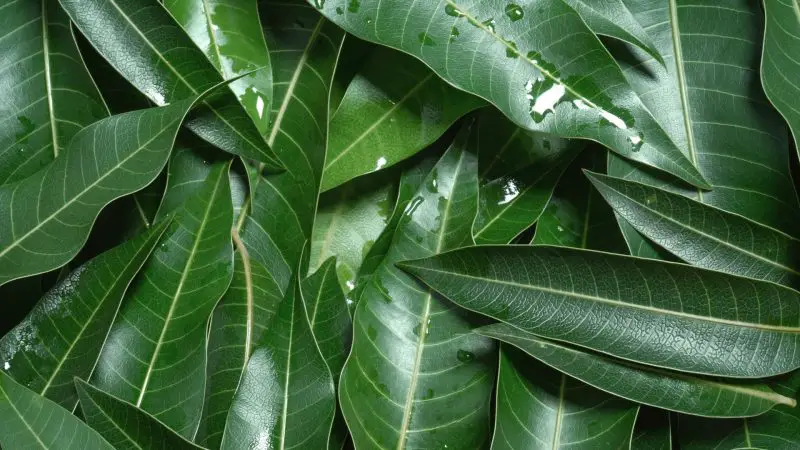
It’s not recommended to feed mango leaves to guinea pigs because these leaves also contain urushiol. This compound contains some allergens that can be harmful to them.
Can Guinea Pigs Eat Mango Seeds?
Guinea pigs can’t eat mango seeds. These seeds are a choking hazard for guinea pigs and can cause them an injury or even lead to their death.
Also, mango seeds are too harsh for the cavies to handle. So, be sure to remove the seed of mango before giving this fruit to guinea pigs.
Can Guinea Pigs Eat Dried Mango?
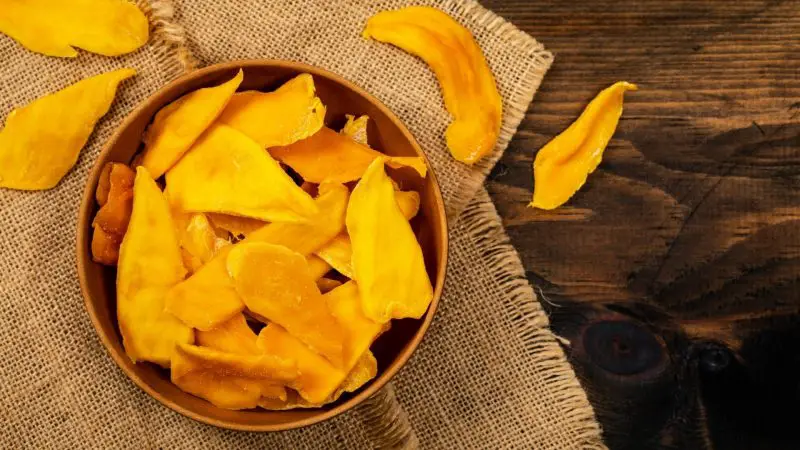
Guinea pigs can’t eat dried mango due to its sugar content. Dried mango can contain around five times more sugar than fresh mango. Sugar can be very harmful to guinea pigs and cause obesity or even diabetes. So, it’s important to avoid feeding dried mango to guinea pigs and give them only fresh mangoes.
Can Guinea Pigs Eat Frozen Mango?
Guinea pigs can only eat the one that wasn’t previously processed and that was previously defrosted at room temperature.
Guinea pigs shouldn’t eat frozen foods because these foods are usually treated or boiled before freezing. In that form, mango may be harmful to the guinea pig’s sensitive digestive system.
Frozen mango that isn’t previously defrosted can upset guinea pigs’ stomachs. Also, it isn’t good for their teeth because of its cold temperature. Guinea pigs will enjoy fresh mangoes more.
Can Guinea Pigs Eat Yellow Mango?
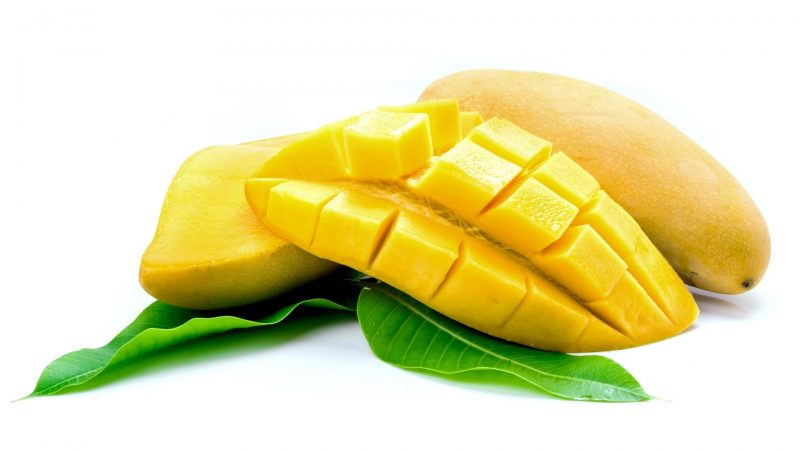
Guinea pigs can eat yellow mango but also only in moderation. Yellow mangoes are also known as honey mangoes. You should feed them to guinea pigs only in small serving sizes, two or three times a week because of their sugar content.
These mangoes can be a little bit sweeter than regular mangoes and contain even 15 g of sugar per 100 g of mangoes.
Can Guinea Pigs Have Mango Juice?
Guinea pigs can’t have mango juice or any other type of juice that is bought in the store. The only drink that you can comfortably offer your guinea pig is water. Anything aside from that is not safe.
The only other alternative is a small amount of homemade natural mango juice that is heavily diluted with water and without added sugars. Mango juice from the store, for instance, is too sweet for your guinea pig’s fragile stomach.
Quick Facts on Mangoes
You probably know mango as a sweet and delicious fruit that is filled with a myriad of nutrients. In the following section, we will provide you with more information about this fruit that you probably didn’t know.
- Mangoes have different flavors that depend on the ripeness factor.
- The content of nutrients in mangoes, especially vitamins, varies depending on how ripe or unripe the fruit is.
- Papin found in mangoes is a naturally occurring tenderizer and it is commonly used can for marinating meat.
- Mangoes are some of the earliest fruits that were cultivated in the world.
- A cup of fresh mango serving has about 100 calories and 3 grams of dietary fiber.
- A high percentage of mangoes is water, which accounts for 83% of the total fruit’s weight.
- Mangoes are planted all over the world and are among the most popular fruits on the planet.
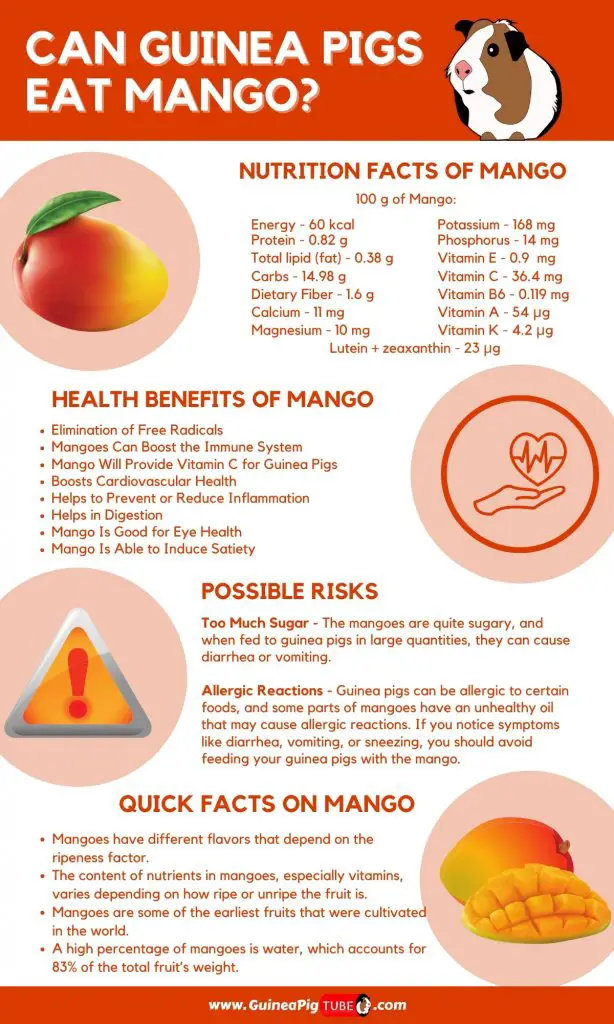
We have also made a full list of foods that guinea pigs can and can’t eat (150+ Types of Foods). Be sure to also check our recommended products page for everything you will ever need to assure a happy life for your guinea pigs. Hope this information was helpful and you have found the answer you were looking for.
List of Sources
The Effects of Diet on Anatomy, Physiology and Health in the Guinea Pig
Chemical Composition of Mango (Mangifera indica L.) Fruit: Nutritional and Phytochemical Compounds
